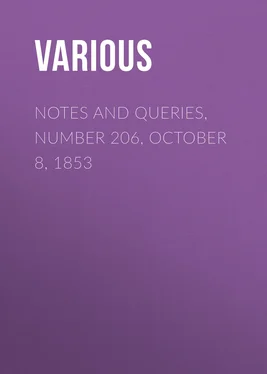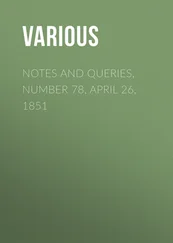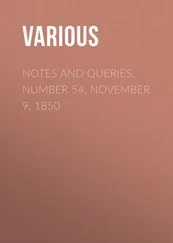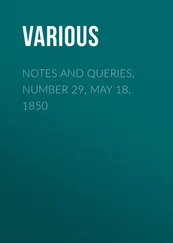Various - Notes and Queries, Number 206, October 8, 1853
Здесь есть возможность читать онлайн «Various - Notes and Queries, Number 206, October 8, 1853» — ознакомительный отрывок электронной книги совершенно бесплатно, а после прочтения отрывка купить полную версию. В некоторых случаях можно слушать аудио, скачать через торрент в формате fb2 и присутствует краткое содержание. Жанр: foreign_antique, periodic, foreign_edu, на английском языке. Описание произведения, (предисловие) а так же отзывы посетителей доступны на портале библиотеки ЛибКат.
- Название:Notes and Queries, Number 206, October 8, 1853
- Автор:
- Жанр:
- Год:неизвестен
- ISBN:нет данных
- Рейтинг книги:4 / 5. Голосов: 1
-
Избранное:Добавить в избранное
- Отзывы:
-
Ваша оценка:
- 80
- 1
- 2
- 3
- 4
- 5
Notes and Queries, Number 206, October 8, 1853: краткое содержание, описание и аннотация
Предлагаем к чтению аннотацию, описание, краткое содержание или предисловие (зависит от того, что написал сам автор книги «Notes and Queries, Number 206, October 8, 1853»). Если вы не нашли необходимую информацию о книге — напишите в комментариях, мы постараемся отыскать её.
Notes and Queries, Number 206, October 8, 1853 — читать онлайн ознакомительный отрывок
Ниже представлен текст книги, разбитый по страницам. Система сохранения места последней прочитанной страницы, позволяет с удобством читать онлайн бесплатно книгу «Notes and Queries, Number 206, October 8, 1853», без необходимости каждый раз заново искать на чём Вы остановились. Поставьте закладку, и сможете в любой момент перейти на страницу, на которой закончили чтение.
Интервал:
Закладка:
Various
Notes and Queries, Number 206, October 8, 1853 / A Medium of Inter-communication for Literary Men, Artists, Antiquaries, Genealogists, etc
Notes
NOTES ON NEWSPAPERS: "THE TIMES," DAILY PRESS, ETC
A newspaper, rightly conducted, is a potent power in promoting the well-being of universal man. It is also a highly moral power—for it quickens mind everywhere, and puts in force those principles which tend to lessen human woe, and to exalt and dignify our common humanity. The daily press, for the most part, aims to correct error—whether senatorial, theological, or legal. It pleads in earnest tones for the removal of public wrong, and watches with a keen eye the rise and fall of great interests. It teaches with commanding power, and makes its influence felt in the palace of the monarch, as well as through all classes of the community. It helps on, in the path of honorable ambition, the virtuous and the good. It never hesitates or falters, however formidable the foe. It never crouches, however injurious to itself the free and undisguised utterance of some truths may be. It is outspoken. When the nation requires them, it is bold and fearless in propounding great changes, though they may clash with the expectations of a powerful class. It heeds the reverses to which a nation is subjected, and turns them to good account. It does not abuse its power, and is never menaced. It is unshackled, and therefore has a native growth. It looks on the movements of the wide world calmly, deliberately, and intelligently. We believe the independency of the daily press can never be bribed, or its patronage won by unlawful means. Its mission is noble, and the presiding sentiment of the varied intellect employed upon it is "the greatest good to the greatest number." It never ceases in its operations. It is a perpetual thing: always the same in many of its aspects, and yet always new. It is untiring in its efforts, and unimpeded in its career. We look for it every day with an unwavering confidence, with an almost absolute certainty. Power and freshness are its principal characteristics; and with these it combines a healthy tone, a fearless courage, and an invincible determination. That it has its imperfections, we do not deny—and what agency is without them? It is not free from error, and no estate of the realm can be. The purity of the public press will be increased as Christianity advances. There is no nation in the world which can boast of a press so moral, and so just, as the daily newspaper press of Great Britain. The victories it achieves are seen and felt by all: and when compared with the newspaper press of other countries, it has superior claims to our admiration and regard.
Taking The Times as the highest type of that class of newspapers which we denominate the daily press, these remarks will more particularly apply. The history of such a paper, and its wonderful career, is not sufficiently known, and its great commercial and intellectual power not adequately estimated. The extinction of such a journal (could we suppose such a thing,) would be a public calamity. Its vast influence is felt throughout the civilised world; and we believe that influence, generally speaking, is on the side of right, and for the promotion of the common weal. It is strange that such an organ of public sentiment should have been charged with the moral turpitude of receiving bribes. That it should destroy its reputation, darken its fair fame, and undermine the very foundation of its prosperity, by a course so degrading, we find it impossible to believe. We feel assured it is far removed from everything of the kind: that its course is marked by great honesty of purpose, and its exalted aim will never allow it to stoop to anything so beneath the dignity of its character, and so repugnant to every sense of rectitude and propriety. It is no presumption to assert that, under such overt influences, it remains unmoved and immovable; and to reiterate a remark made in the former part of this article, "its independency can never be bribed, or its patronage won by unlawful means." Looking at it in its colossal strength, and with its omnipotent power (for truth is omnipotent), it may be classed, without any impropriety, among the wonders of the world.
Allow me to give to the readers of "N. & Q." the following facts in connexion with The Times , and on the subject of newspapers generally. They are deserving of a place in your valuable journal. There were sold of The Times on Nov. 19, 1852, containing an account of the Duke of Wellington's funeral, 70,000 copies: these were worked off at the rate of from 10,000 to 12,000 an hour. The Times of Jan. 10, 1806, with an account of the funeral of Lord Nelson, is a small paper compared with The Times of the present day. Its size is nineteen inches by thirteen: having about eighty advertisements, and occupying, with woodcuts of the coffin and funeral car, a space of fifteen inches by nine. Nearly fifty years have elapsed since then, and now the same paper frequently publishes a double supplement, which, with the paper itself, contains the large number of about 1,700 advertisements. 1 1 The largest number of advertisements in one paper with a double supplement was in June last, 2,250.
54,000 copies of The Times were sold when the Royal Exchange was opened by the Queen; 44,500 at the close of Rush's trial. 1828, the circulation of The Times was under 7,000 a day; now its average circulation is about 42,000 a day, or 12,000,000 annually. 2 2 The quantity of paper used for The Times with a single supplement is 126 reams, each ream weighing 92 lbs., or 7 tons weight of paper; with a double supplement, 168 reams.
The gross proceeds of The Times , in 1828, was about 45,000 l. a year: and, from an article which appeared twelve months ago in its columns, it now enjoys a gross income equal to that of a flourishing German principality.
We believe we are correct when we assert, that there were sold of the Illustrated London News , with a narrative of the Duke's funeral (a double number), 400,000 copies. One newsman is said to have taken 1000 quires double number, or 2000 quires single number: making 27,000 double papers, or 54,000 single papers (twenty-seven papers being the number to a quire), and for which he must have paid 1075 l 3 3 During the week of the Duke's funeral, there were issued by the Stamp Office to the newspaper press more than 2,000,000 of stamps.
. It is a remarkable fact, that Manchester, with a population of 400,000, has but three newspapers; Liverpool, with 367,000, eleven; Glasgow, with 390,000, sixteen; Dublin, with but 200,000, no less than twenty-two. The largest paper ever known was published some years ago by Brother Jonathan, and called the Boston Notion . The head letters stand two inches high; the sheet measures five feet ten inches by four feet one inch, being about twenty-four square feet; it is a double sheet, with ten columns in each page; making in all eighty columns, containing 1,000,000 letters, and sold for 3½ d. In the good old times, one of the earliest provincial newspapers in the southern part of the kingdom was printed by a man named Mogridge, who used to insert the intelligence from Yorkshire under the head "Foreign News."
It is curious to search a file of old newspapers. It is seldom we have the opportunity of doing so, because we rarely preserve them in consecutive order. It is easy to keep them, and would repay the trouble, and their value would increase as years rolled on. Such reading would be very interesting, and more so than we can at all imagine. It is a history of every day, and a record of a people's sayings and doings. It throws us back on the past, and makes forgotten times live again. Some of the early volumes of The Times newspaper, for instance, would be a curiosity in their way. We should read them with special interest, as reflecting the character of the age in which they appeared, and as belonging to a series exercising a mighty influence in moulding and guiding the commercial and political opinions of this great nation. The preservation of a newspaper, if it be but a weekly one, will become a source of instruction and amusement to our descendants in generations to come.
Читать дальшеИнтервал:
Закладка:
Похожие книги на «Notes and Queries, Number 206, October 8, 1853»
Представляем Вашему вниманию похожие книги на «Notes and Queries, Number 206, October 8, 1853» списком для выбора. Мы отобрали схожую по названию и смыслу литературу в надежде предоставить читателям больше вариантов отыскать новые, интересные, ещё непрочитанные произведения.
Обсуждение, отзывы о книге «Notes and Queries, Number 206, October 8, 1853» и просто собственные мнения читателей. Оставьте ваши комментарии, напишите, что Вы думаете о произведении, его смысле или главных героях. Укажите что конкретно понравилось, а что нет, и почему Вы так считаете.












